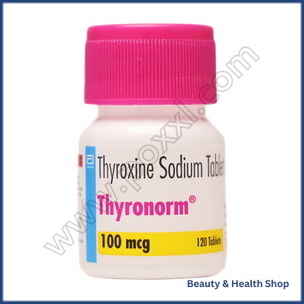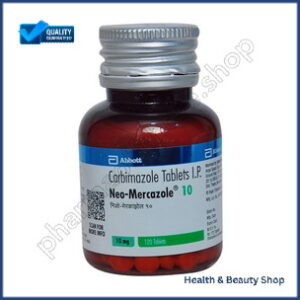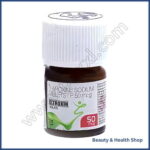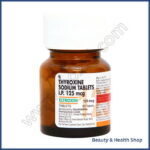ADDICTION
ALCOHOL DEPENDENCE
QUIT SMOKING
ALLERGY
ANTI FUNGAL
FUNGAL INFECTION
FUNGAL NAIL INFECTIONS
ANTI-REJECTION DRUGS
ANTI WORM
ANTIBIOTIC
BACTERIAL INFECTIONS
ARTHRITIS
GOUT
OSTEOARTHRITIS
RHEUMATOID ARTHRITIS
BLOOD
LOW PLATELET COUNT
THROMBOPHLEBITIS
VARICOSE VEINS
COLON
ANAL FISSURE
PILES
ULCERATIVE COLITIS
DIABETES CARE
DIABETES INSIPIDUS
DIABETES TYPE
DIABETIC FOOT ULCERS
GLUCOSE MONITOR
EYES/EAR CARE
DRY EYES
EYE CARE
EYE EXAMINATION
EYE INFECTION
EYE LASHES
EYE PAIN
GLAUCOMA
OCULAR HYPERTENSION
UVEITIS
FEVER CARE
MALARIA
RHEUMATIC FEVER
TYPHOID FEVER
GASTROINTESTINAL
ACIDITY
CONSTIPATION
CROHN'S DISEASE
DIARRHOEA
GALLBLADDER STONES
INTESTINAL ULCERS
IRRITABLE BOWEL SYNDROME
MOTION SICKNESS
NAUSEA
Thyronorm (Thyroxine Sodium)
Thyronorm 50 Mcg (Thyroxine Sodium)
| Amount | Price | Price / Unit |
Qty | ||
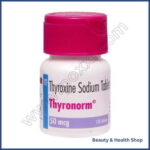
|
3 Bottles | $49.00 | $16.33 |
||

|
6 Bottles | $74.00 | $12.33 |
||

|
12 Bottles | $111.00 | $9.25 |
Thyronorm 75 Mcg (Thyroxine Sodium)
| Amount | Price | Price / Unit |
Qty | ||
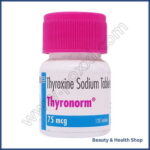
|
3 Bottles | $56.00 | $18.67 |
||

|
6 Bottles | $81.00 | $13.50 |
||

|
12 Bottles | $133.00 | $11.08 |
Thyronorm 100 Mcg (Thyroxine Sodium)
| Amount | Price | Price / Unit |
Qty | ||
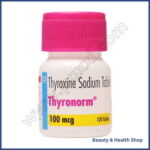
|
3 Bottles | $69.00 | $23.00 |
||

|
6 Bottles | $94.00 | $15.67 |
||

|
12 Bottles | $156.00 | $13.00 |
Thyronorm 125 Mcg (Thyroxine Sodium)
| Amount | Price | Price / Unit |
Qty | ||
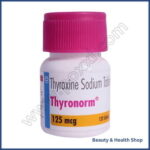
|
3 Bottles | $81.00 | $27.00 |
||

|
6 Bottles | $111.00 | $18.50 |
||

|
12 Bottles | $186.00 | $15.50 |
| Active Ingredient (Generic Name): | Thyroxine Sodium |
|---|---|
| Indication: | Hypothyroidism |
| Manufacturer | Abbott India Pvt Ltd |
| Packaging: | 120 tablets in one bottle |
From: $81.00
Thyronorm is prescribed to treat hypothyroidism, a condition resulting from insufficient thyroxine production by the thyroid gland. This medication helps regulate metabolism and energy levels. It is also used for treating cretinism in infants and children and myxedema in adults. Thyronorm can lead to increased energy, weight loss, and improved hair, skin, and nail health. Possible side effects include gastrointestinal issues, headaches, and fatigue. It is important to follow the prescribed dosage, administration instructions, and precautions for safe and effective treatment.
Main Points
- Thyronorm is prescribed to treat hypothyroidism by replacing deficient thyroid hormones, helping to restore normal bodily functions and energy levels.
- The medication aids in metabolism and energy production by converting to triiodothyronine (T3) in the liver.
- Initial dosages typically range from 25-50 mcg, adjusted based on factors such as age, weight, and medical condition, with specific administration instructions for optimal effectiveness.
- Common side effects may include gastrointestinal discomfort, headaches, and fatigue, while severe symptoms could involve heart palpitations and chest pain.
- Caution should be taken when administering Thyronorm to patients with uncontrolled adrenal insufficiency, untreated thyrotoxicosis, or during pregnancy or breastfeeding.
What Is Thyronorm Used For?
Thyronorm is a synthetic thyroid hormone prescribed to treat hypothyroidism, a condition caused by insufficient thyroid hormone production. It is used when the thyroid gland does not produce enough thyroxine, a hormone essential for growth and development. Thyronorm may be recommended after thyroid surgery, radioactive iodine therapy, or in cases of autoimmune diseases like Hashimoto’s thyroiditis.
Additionally, Thyronorm is used to treat cretinism in infants and children, a condition that leads to physical and mental retardation due to thyroid hormone deficiency. It is also prescribed for myxedema in adults, a condition characterized by dry skin, hair loss, and fatigue resulting from severe hypothyroidism.
If you are experiencing symptoms like fatigue, weight gain, dry skin, or hair loss, your doctor may suggest Thyronorm to replace the lacking thyroid hormones and restore normal body function.
How Thyronorm Works in Body
When you ingest Thyronorm, the synthetic thyroid hormone enters your bloodstream, stimulating metabolism and energy production. This is due to thyroxine sodium, the active component in Thyronorm, being identical to the natural thyroid hormone your body produces. Once absorbed, thyroxine sodium is converted to triiodothyronine (T3) in the liver, a crucial form of the hormone. T3 then binds to specific receptors in your cells, boosting metabolic rate and energy levels.
The accelerated metabolism aids in more efficient nutrient breakdown, releasing stored energy and improving overall physical and mental performance. Thyronorm functions by restoring the deficient thyroid hormone in your body, rebalancing the endocrine system. This helps regulate essential bodily functions, ensuring proper functioning of organs and tissues.
Benefits of Taking Thyronorm
Taking Thyronorm can help regulate your metabolism and improve your energy levels by replenishing deficient thyroid hormones in your body. This can lead to increased energy levels, reduced fatigue, and potential weight loss. Thyronorm also aids in promoting healthier hair, skin, and nails. Additionally, it may alleviate symptoms of depression and anxiety, contributing to better mental well-being. By effectively managing hypothyroidism with Thyronorm, you can lead a more balanced and healthy life.
Thyronorm Dosage and Administration
When taking Thyronorm, it is crucial to adhere to specific dosage instructions for safe and effective treatment. Review the administration guidelines provided by your healthcare provider or on the medication label to understand the recommended dosage and frequency. This will help you manage hypothyroidism effectively and reduce the risk of adverse effects.
Dosage Instructions
Administer Thyronorm (thyroxine sodium) orally once daily on an empty stomach, at least 30 minutes to 1 hour before breakfast for optimal absorption. The initial dosage typically ranges from 25-50 mcg, subject to adjustment based on individual response.
Dosage may vary based on age, weight, and medical condition, determined by your healthcare provider. The following dosage ranges are generally recommended:
- Adults: 25-50 mcg
- Pediatric (6-12 years): 12.5-25 mcg
- Pediatric (1-5 years): 6.25-12.5 mcg
Adhere strictly to prescribed instructions. Do not alter dosage or discontinue treatment without medical consultation. Regular monitoring of thyroid hormone levels is essential for dosage adjustments.
Administration Guidelines
For optimal absorption and to reduce the risk of interactions, it is recommended to take Thyronorm (thyroxine sodium) with a full glass of water, avoiding the intake of food, supplements, or medications at the same time. Consistency in dosing is important, so it is advisable to take Thyronorm at the same time each day, preferably in the morning. Swallow the tablet whole without crushing or chewing to maintain the medication’s release mechanism.
Avoid consuming grapefruit or grapefruit juice while taking Thyronorm, as it can impact the medication’s absorption. It is also important to refrain from taking antacids, calcium supplements, or iron supplements within four hours of Thyronorm to prevent reduced absorption. If a dose is missed, take it as soon as remembered unless it is near the next scheduled dose, in which case skip the missed dose and continue with the regular dosing regimen. Adhere to the specific administration instructions provided by your healthcare provider and thoroughly review the patient information leaflet.
Possible Side Effects and Risks
While taking Thyronorm, it’s essential to be aware of potential side effects and risks. Common reactions like headache, nervousness, or sweating are usually mild and temporary. However, recognizing signs of serious thyroid symptoms is crucial as they can lead to severe consequences if untreated.
Common Adverse Reactions
Common adverse reactions to Thyronorm (Thyroxine Sodium) may include gastrointestinal issues like diarrhea, abdominal cramps, and vomiting, affecting around 10% of patients. These symptoms are more likely to occur at the beginning of treatment and typically improve as your body adjusts. Other common reactions can include headaches, fatigue, heat intolerance with increased sweating, changes in appetite leading to weight fluctuations, and mood swings like anxiety or irritability. Individual experiences may vary, and consulting your healthcare provider for guidance on managing these effects is recommended for optimal treatment outcomes.
Serious Thyroid Symptoms
Serious thyroid symptoms may include heart palpitations, atrial fibrillation, and chest pain, indicating potential issues with excessive thyroid hormone levels or sensitivity to Thyronorm. These symptoms require immediate medical attention. If you experience any of these signs, contact your doctor promptly.
In rare instances, Thyronorm could lead to more severe thyroid-related conditions like thyroid storm, a critical state marked by fever, rapid heartbeat, and heart rhythm disturbances. Other uncommon but serious side effects may involve osteoporosis, reduced bone density, and higher fracture risks, particularly in postmenopausal women.
Regular monitoring of thyroid hormone levels and adjusting Thyronorm dosage as needed is crucial in minimizing the risk of these severe symptoms. Routine blood tests and doctor visits can help detect any potential problems early, enabling timely intervention to prevent complications. Being informed about these possible side effects allows you to take proactive measures to ensure your safety during Thyronorm treatment.
Precautions and Contraindications
Thyronorm therapy should be approached cautiously in patients with uncontrolled adrenal insufficiency, untreated thyrotoxicosis, recent myocardial infarction, or during pregnancy or breastfeeding. These conditions pose risks that need to be carefully considered before initiating Thyronorm treatment. By evaluating individual patient factors and taking necessary precautions, healthcare providers can minimize the potential adverse effects and ensure safe and effective therapy.
Frequently Asked Questions
Can Thyronorm Be Used for Thyroid Cancer Treatment?
When considering thyroid cancer treatment, it’s important to note that Thyronorm is not typically the primary treatment. Surgery, radioactive iodine therapy, and external radiation therapy are commonly used instead. In some cases, Thyronorm may be prescribed to suppress thyroid-stimulating hormone (TSH) production, which can aid in preventing cancer recurrence. However, this usage requires close medical supervision as part of a comprehensive treatment plan.
Is Thyronorm Available Over-The-Counter or by Prescription Only?
Thyronorm, a thyroid medication, is typically not available over-the-counter. A prescription from a doctor is usually required to obtain thyroid hormones like thyroxine. This is because these medications need careful monitoring and dosage adjustments. They are not sold on pharmacy shelves or online without a valid prescription. Getting a prescription ensures that you receive the correct dosage and helps minimize potential risks. Your doctor will prescribe the appropriate medication, such as Thyronorm, and oversee your progress to ensure effective treatment.
Can I Take Thyronorm With Other Thyroid Medications?
When considering combining thyroid medications, it is generally not recommended due to the potential for unpredictable effects on thyroid hormone levels. However, under medical guidance, it may be possible to safely take Thyronorm with other thyroid medications. Close monitoring of hormone levels and dosage adjustments may be necessary to prevent adverse interactions.
Does Thyronorm Affect Birth Control Pill Effectiveness?
When taking birth control pills, it’s important to consider potential interactions with other medications. Studies indicate that thyroid hormones, such as thyroxine, can accelerate the breakdown of estrogen, potentially reducing the effectiveness of oral contraceptives. Adjusting the dosage of your birth control or exploring alternative contraceptive methods may be necessary to ensure reliable protection. It’s advisable to consult your healthcare provider to determine the most appropriate course of action for your specific needs.
Can Thyronorm Be Used During Pregnancy or Breastfeeding?
During pregnancy, it is generally not recommended to use thyroid hormone replacement medications due to potential effects on fetal development. However, untreated hypothyroidism can be harmful to both the mother and the baby. In breastfeeding, these medications are typically considered safe. It is important to monitor the baby for any signs of thyroid issues. Consult a healthcare provider for personalized advice on managing thyroid conditions during pregnancy and breastfeeding.
Conclusion
You have been prescribed Thyronorm for hypothyroidism management. Understanding its purpose, mechanism of action, and benefits empowers you to take charge of your treatment. Adhere strictly to the dosage and administration guidelines and be mindful of potential side effects and risks. Following these instructions diligently will enable you to effectively manage your condition and enhance your overall well-being.


